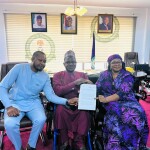Having considered a number of factors, UBA launches Africa's first braille banking form in Lagos. Drum rolls! But shouldn't compliance just remain its own reward?
By Elijah Olusegun
According to Sightsavers, 24 million people have lost their vision in Nigeria—out of the over 35 million the National Commission for People With Disabilities claims have disabilities. It takes a stretch of the imagination for critical minds to believe the global development NGO’s 2022 figure. But when they do, any half measures policymakers take to address rights issues about visual impairments generate, naturally, lots of media puffery and goodwill.
Like the braille account opening form United Bank of Africa unveiled in Lagos on June 27. Superstar Cobhams Asuquo and LASODA's former GM Dare Dairo couldn’t help swooning.
“I am beyond elation,” the music producer said at the launch. Dare, too, was “so elated at this initiative”.
But their fawning didn't sway most members of the disability communities, including the Lagos chapter of the National Association of the Blind (NAB), present at the launch. From their preliminary review, they regard the UBA stunt as pulling the wool over their eyes when it comes to financial inclusion.
A braille account opening form is about the least of accessibility features blind Nigerians have the right to enjoy. Its lack or absence is discrimination, under the Discrimination Act 2018 (Section 1, subsection 1). And there is nothing special about it, though the bank’s Executive Director, Finance and Risk Management Ugo Nwaghodoh referred to the users as the bank’s “special customers” who now have “equal opportunities available to our customers”.
Fact is: the ground is not level yet between the bank's two classes of customers.
With 27 million customers, UBA has no readers and other accessibility features on its website and apps. That is in disregard of the CBN’s Financial Inclusion Strategy, the National Fintech Strategy, and the Payment System Vision 2025. If only the apex bank is ready to admit nothing has changed since it rolled out these policies in 2022 to specifically make banks’ digital interfaces and other services accessible to the blind and other PWDs.
“We have done many surveys, and we have found out that in Nigeria, banking apps are not accessible,” Assistive Technology and Disability Policy expert Ope Akinola told ER in an interview. “Some of them allow you to access their apps and complete your transactions after a lot of hassles. They are not designed to be easy to use for the blind.”
Of the UBA’s 2,669 ATM points across Nigeria, none has been activated to walk blind customers through private transactions with the machine speech features.
Asuquo described the form as trail-blazing. He has some reasons, personal ones. “Before now, we have always been at the mercy of the reader when we want to do things like open accounts for ourselves,” he said. But not all agree with him. And the form is not a cure-all for all the accessibility problems the blind face inside a banking hall.
"It is motion without movement. It's nothing," Salami Lukman, NAB's chairman, told ER.
The content of the form, he explained, is translated into braille so a blind customer can read only. The independence Asuquo talked about hardly exists.
"You will still need somebody to help you fill the form," the lawyer said.
And all of that is just about account opening forms only. Like all others, UBA has yet to roll out tellers or loan application forms in braille formats. Except they are of no significance during in-person banking daily.
There is no denying the effort the UBA put in to the accessibility feature, considering that it is an outcome of a collaboration with the Anglo-Nigerian Welfare Association for the Blind (ANWAB) which might be pushing its on agenda. But it is still business. The cost benefit-analysis of meeting the need of that segment of its customer base , for a continental bank like UBA, must have added up to the bottom line. So, in the main, the so-called innovation boils down to a corporate body being basically law-abiding.
The Discrimination Act that provides for accessibility and inclusion has not got a bite yet, and cannot punish banks for not implementing the provisions of the law.
Until next February.
Lawyers with disabilities told ER the five-year window of opportunity the Act allows will expire then.
Banks complying, b then, will not necessarily trigger explosions of goodwill and praise-singing from LASODA and others.







